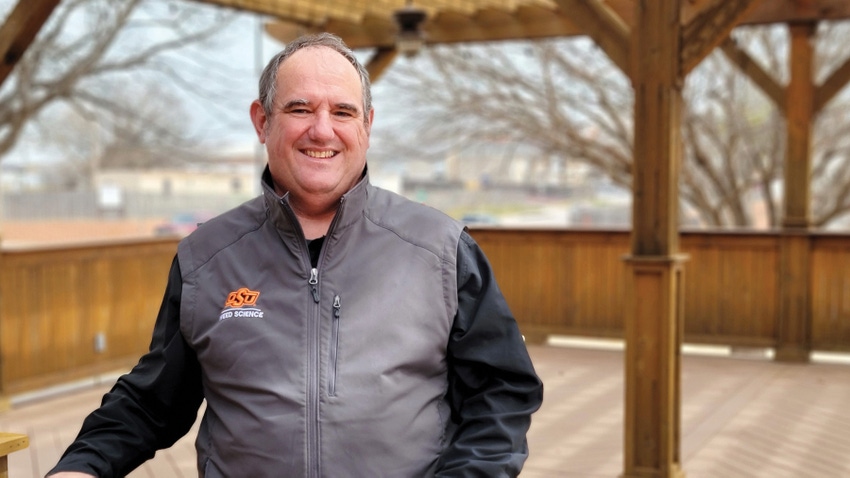
Todd Baughman takes the reins as director of the Texas A&M AgriLife Research and Extension Center in Lubbock April 1.
Baughman says he’s assuming the position “not replacing Jaroy Moore,” who is retiring.
��“I will not replace Jaroy. I’m not sure anyone can replace him. He’s been in the Texas A&M system for 40-plus years and at the Lubbock center for more than 20. He has done an outstanding job for the center and for the region. I just hope I can, maybe, adequately fill his shoes. But there is no replacing an icon like Jaroy.
“I look forward to the opportunity to interact and work with him; he is an outstanding man.”
Baughman comes to the position with a full resume. He earned BS and MS degrees in agronomy at Oklahoma State University and a Ph.D. in agronomy and weed science at Mississippi State. He worked for Sandoz Agro before taking a position as Texas AgriLife Extension agronomist at Vernon, Texas, where he also served as state peanut specialist for 10 of the 15 years he worked there.
He moved back to his home state of Oklahoma 12 years ago where he has worked primarily in row crop weed science. “I’ve worked across the board in row crops, even some pasture work.”
The hardest thing about leaving Ardmore, Okla., Baughman says, is “leaving relationships with the many outstanding colleagues and producers in the state.
“I look forward to working at the Lubbock Research and Extension Center. I have been impressed with the reputation of the outstanding faculty there. Center scientists work on the critical issues affecting the region. They have built a remarkable reputation.”
Baughman says support from outside academia is another enticement. “Several agricultural industries have headquarters in Lubbock. The ability to work closely with those groups offers many opportunities. Lubbock’s reputation as a hub for industry has increased over time.”
He adds that several commodity organizations have headquarters in Lubbock, including Plains Cotton Growers, National Sorghum Producers, and Texas Corn Growers.
“I don’t know of many places with that kind of faculty, industry, and commodity support in one region,” Baughman says. “Working in a setting like that offers unique opportunities and some challenges.” The opportunity to collaborate with Texas Tech University, West Texas A&M University, and USDA-ARS will provide additional partners to answer critical agriculture questions in the region.
Priorities
He has set some priorities.
“One of the first is to have the faculty realize that I’m there to support them and help them achieve their professional and research goals. I’m part of their team. I want to support them and provide the things they need to be successful. If they are successful, that means the Center and I also succeed.”
Second, he says, is appreciating and supporting the role cotton plays across the High Plains.
“Determining what we can do to continue the success of cotton and interacting with other commodities to develop the best management systems is a high priority.”
Water, he adds, will always be an integral part of that effort. “Water is a critical issue, a precious commodity we have to make the best use of with irrigation and on dryland acreage. We need to consider how best to manage that resource.
“Water is the critical element in production. Some exciting water management practices have been created here and are in use across the U.S. Continuing that work is critical to the region.”
Baughman says his primary responsibility will be with research. “But several faculty members have split appointments, so I want to help them to succeed in both roles.
“ Ultimately, our goal is to see agricultural producers succeed. The best way is through a team approach. We want to build a framework of research, specialists, and county educators. We accomplish more as a team than we can as individuals. Cross-communication will be a key.”
Baughman says his experience across both arenas, research and extension, helps him understand the overall mission of each. “A positive thing about the region is that both sides have been strong. It is important to build on those successes.”
Sustainable cropping systems
Baughman said efforts to support sustainable cropping systems will play a huge role in the Center’s objectives.
“I don’t want to predict what we will be able to do,” he says. “Government programs likely will change to more adaptive systems. Climate policy will be a factor. Those issues make research into cropping systems extremely important. I believe everyone recognizes the importance of sustainable cropping systems.
“To make those efforts successful, we must try to answer growers’ questions before they are needed.”
The Land Grant System, he says, is best prepared to address many of those issues. “Ongoing research at Lubbock is set up to be the answer for a lot of farmers.”
Baughman says he is excited to work with the “extremely resourceful and innovative farmers in the region. I look forward to developing relationships with those individuals and understanding their issues. That’s what will make the job fun.”
Producer, commodity input
Baughman says input from farmers and commodity groups has always been a top priority in his work in research and extension. “What do growers think our goals should be? I have always tried to find out with any of my programs at A&M or OSU.”
Baughman says his family has deep roots in Oklahoma, “four generations in my home county,” but the position at the Lubbock Research and Extension Center offers an opportunity to work in a region “dominated by agriculture. I look forward to being in the middle of that. Lubbock is like a spike on a wheel. Agriculture touches 100% of many of those communities.
“I am excited, looking forward to getting boots on the ground.”
About the Author(s)
You May Also Like






